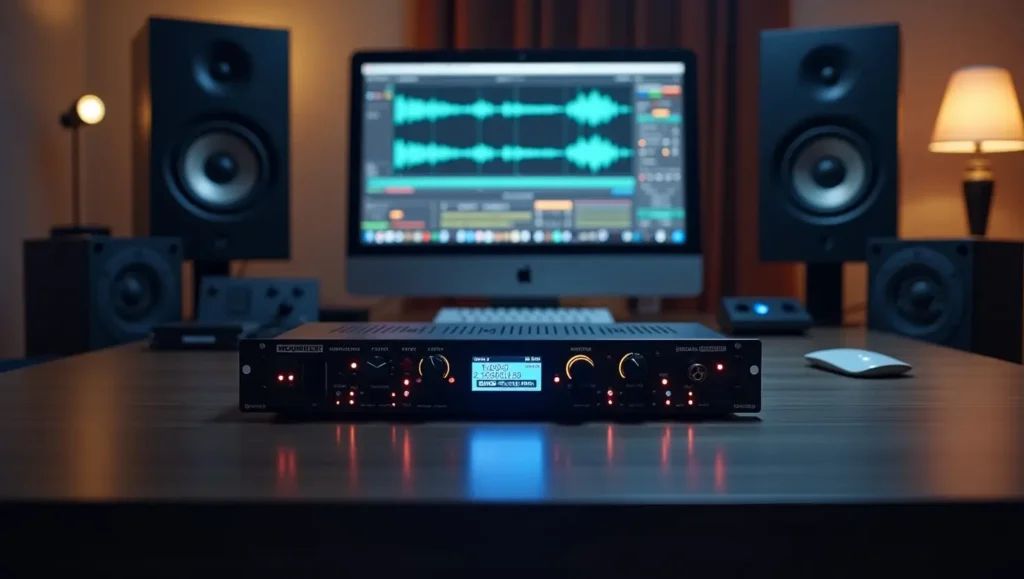Introduction
welcome to denzidesign.com In today’s digital age, audio quality matters more than ever. Whether you’re a music enthusiast, a car audio aficionado, or a professional sound engineer, a digital sound processor (DSP) can significantly enhance your listening experience. But what exactly is a DSP, and why is it essential? This guide will break down the fundamentals of digital sound processing, explain how it works, and explore why you need one.
What is a Digital Sound Processor?
A Digital Sound Processor (DSP) is an advanced audio processing tool that enhances sound quality by modifying digital audio signals in real-time. Unlike traditional analog systems, which process sound through electrical signals, a DSP operates using algorithms that optimize and refine audio output for better clarity, depth, and precision.
Key Functions of a DSP:
- Equalization (EQ): Adjusts sound frequencies to achieve a balanced audio output.
- Crossover Management: Directs specific frequencies to appropriate speakers (e.g., subwoofers handle bass, tweeters handle highs).
- Time Alignment: Synchronizes sound waves so audio reaches your ears simultaneously for a more immersive experience.
- Noise Reduction & Filtering: Eliminates unwanted background noise for cleaner audio.
- Surround Sound Processing: Creates a more dynamic, three-dimensional soundstage.
How Does a Digital Sound Processor Work?
A DSP works by analyzing, modifying, and enhancing digital sound waves in real-time. Here’s a step-by-step breakdown:
- Receives Input: The DSP takes in an audio signal from a source such as a microphone, amplifier, or car stereo.
- Processes the Signal: It applies filters, equalization, and other enhancements based on pre-set or custom settings.
- Optimizes Output: The processed signal is sent to speakers or headphones, delivering clearer, richer sound.
DSP in Different Audio Applications
1. Car Audio Systems
Many car audio enthusiasts use DSPs to customize and enhance sound quality in vehicles. A DSP in car audio systems allows:
- Clearer bass and treble separation.
- Reduction of unwanted echoes or distortions.
- Custom tuning for optimal sound quality inside a car’s cabin.
2. Home Audio and Home Theaters
- Enhances surround sound for immersive movie experiences.
- Improves clarity in music playback.
- Balances audio levels across different speakers.
3. Professional Audio & Live Sound Systems
- Used in concerts and events for precise sound control.
- Helps in reducing microphone feedback.
- Customizable settings for different venues.
Why Do You Need a Digital Sound Processor?
1. Enhanced Audio Quality
A DSP refines audio signals, ensuring you get the best possible sound with improved clarity, depth, and separation.
2. Customization & Personalization
With a DSP, you have complete control over your audio settings. Adjust frequencies, balance channels, and modify sound profiles to suit your preferences.
3. Noise Reduction & Clarity
A DSP can filter out unwanted background noise and interference, making it a crucial tool for both casual listeners and professionals.
4. Optimized Speaker Performance
Using a DSP allows speakers to operate efficiently by directing specific sound frequencies to the right components, preventing distortion.
5. Ideal for Car Audio Enthusiasts
A digital signal processor for car audio helps fine-tune sound settings, ensuring an immersive audio experience tailored to the acoustics of the vehicle.
Choosing the Right DSP: What to Look For
When selecting a digital sound processor, consider these factors:
1. Compatibility
- Ensure the DSP works with your existing audio system, whether it’s for a car, home theater, or studio setup.
2. Adjustable Equalization (EQ)
- Look for a DSP that offers multiple EQ bands for greater customization.
3. Input & Output Options
- The more input and output channels available, the more flexibility you’ll have when setting up your system.
4. User Interface & Software
- Some DSPs come with mobile apps or software for easier adjustments and tuning.
5. Budget & Features
- Determine your budget and choose a DSP with the necessary features without overspending on unnecessary extras.
Common DSP Models & Brands
Here’s a list of some popular DSPs in the market:
- Helix DSP Ultra – High-end option for audiophiles.
- JL Audio Fix 82 – Great for car audio integration.
- miniDSP 2×4 HD – Affordable and versatile for home and studio use.
- Audison Bit One HD – Premium choice for serious car audio enthusiasts.
Conclusion
A Digital Sound Processor is an essential tool for anyone looking to enhance their audio experience—whether in a car, home theater, or professional studio. It provides superior sound quality, customizable settings, and noise reduction, ensuring that every note and beat sounds exactly as intended.
Call to Action
Ready to take your audio experience to the next level? Explore top-rated DSPs and discover how they can transform your listening experience. Have questions? Drop a comment below or share your thoughts on your favorite DSP model!

